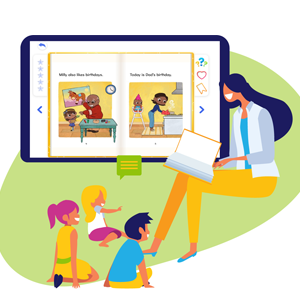Offer encouragement.
Ask what your child likes to do.
Avoid rules and regulations around creativity.
Spend time with your child - tell stories, play dress-up.


Remembering good memories and at the same time listening to them.
Sharing your life experiences and attempting something new with them.
Ask more engaging questions according to their interest.
Foster engagement through playful activities and interactions with your child.
Use mealtimes as an opportunity to connect and bond with your toddler, instead of relying on screens.
Encourage imaginative play and creative activities to stimulate your child's development.
Set boundaries and explain the importance of limiting screen usage to your toddler.
Provide alternative forms of entertainment like reading books, playing games, or doing art projects.


Encourage them to make decisions and act autonomously despite their condition.
Provide adequate assistance
Show understanding and compassion when they struggle.
Prioritize self-care to maintain your own emotional well-being.
Set realistic expectations for yourself and your child, avoiding unnecessary pressure.
Establish a routine that promotes stability and reduces stress for both you and your child.
Seek support from other parents or professionals to share experiences and gain insights.
Choose positive discipline strategies that focus on teaching rather than punishment.


Foster open communication and encourage your child to express their emotions.
Teach empathy by modelling and discussing feelings and perspectives.
Help your child identify and label emotions, promoting emotional awareness.
Encourage problem-solving and teach coping strategies for managing emotions.
Teach emotional regulation techniques, such as deep breathing or taking a break.
Provide a safe and non-judgmental space for your child to share their emotions.
Encourage perspective-taking by discussing different viewpoints and experiences.
Show unconditional love and support to your child.
Practice active listening and engage in meaningful conversations.
Provide consistent and clear boundaries for behaviour.
Spend quality time together and engage in activities they enjoy.


Encourage their strengths and celebrate their accomplishments.
Provide opportunities for them to take on new challenges and succeed.
Teach them positive self-talk and help them reframe negative thoughts.
Encourage them to express their ideas and opinions, and validate their contributions.
Prioritize active listening to fully understand your child's perspective before offering advice.
Respond calmly and empathetically when your child's emotions are heightened, creating a safe space for them to express themselves.
Use open-ended questions to encourage meaningful conversations and help your child explore their thoughts and feelings.

The Montessori Approach is a child-centred educational method that emphasizes hands-on learning and encourages children to explore and learn at their own pace. The approach focuses on developing self-discipline, independence, social skills, and academic knowledge, while fostering a love of learning and curiosity in children.
Here's why you should choose Montessori Approach:
Hands-on learning
Development of independence
Encouragement of creativity
Emphasis on social skills
Respect for individual differences

Experiential learning is the practice of learning through doing and reflecting. It encourages the student to have first-hand experiences with the materials, rather than learning through someone else’s experiences in textbook or lecture.
Here's why you should choose Experiential Learning for your kid:
Develops essential skills
Keeps students engaged
Personalized Learning
Real-world relevance
Retention of information

Inclusive education: is an approach to education that seeks to ensure that all students, regardless of their background, abilities, or disabilities, have access to a quality education that meets their individual needs. Inclusive education values diversity and recognizes that every student has something valuable to contribute.
Here's why you should choose Inclusive Education for your kid:
Inclusive school culture
Empathy, understanding, and acceptance
Academic achievement
Self-esteem
Independence
Skills and confidence

Home-schooling is the education of children at home, typically by parents or tutors, rather than in a formal school setting. It is a form of alternative education that is becoming increasingly popular among families who are seeking greater flexibility, personalized learning, and a more individualized approach to education.
Here's why you should choose Home-schooling for your kid:
Tailored Curriculum
Personalized Learning
Safe and Comfortable Environment
Fewer Distractions

The Traditional method of teaching is referred as teacher-centred, where the teacher is seen as the primary source of knowledge and authority in the classroom. In this approach, students are expected to learn through repetition and memorization.
Here's why you should choose Traditional Approach for your kid:
Familiar to parents
Emphasizes discipline and respect
Mastery of fundamental skills
Structured and predictable
Proven results
